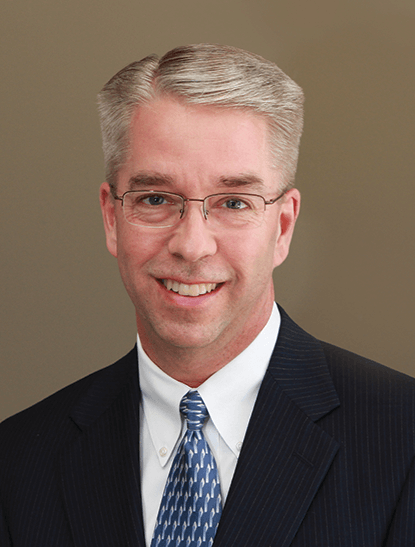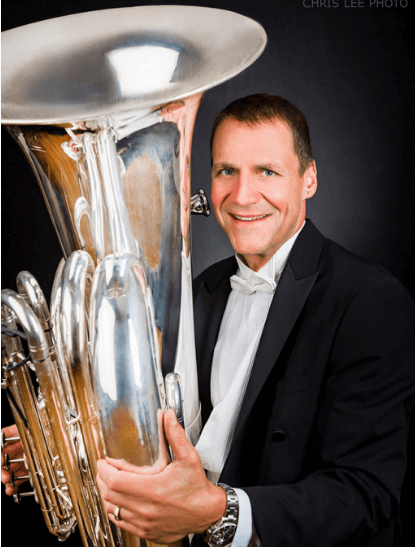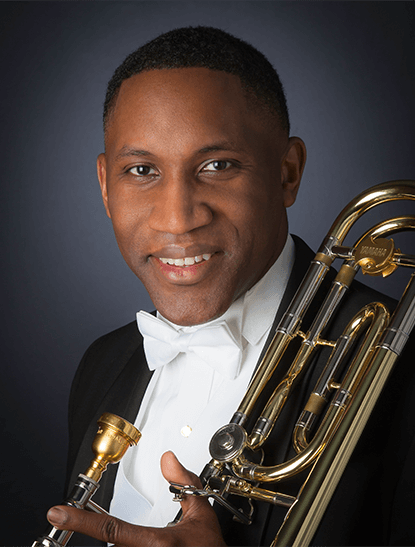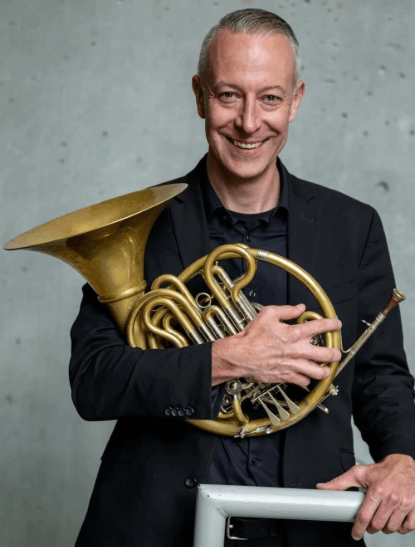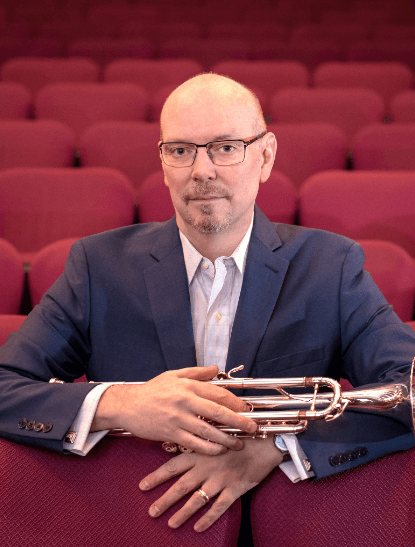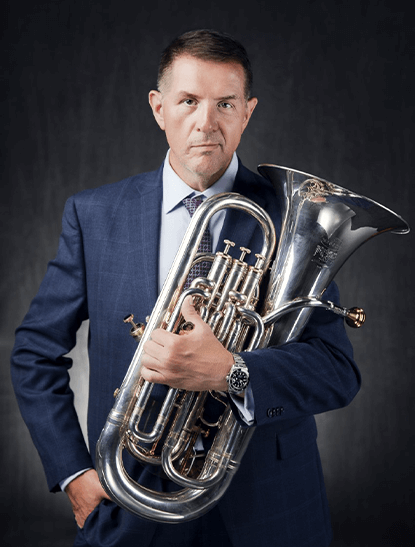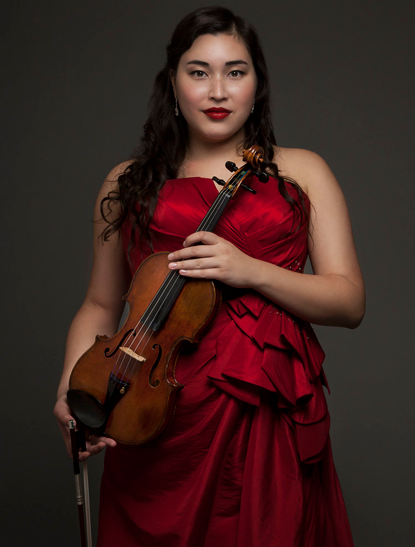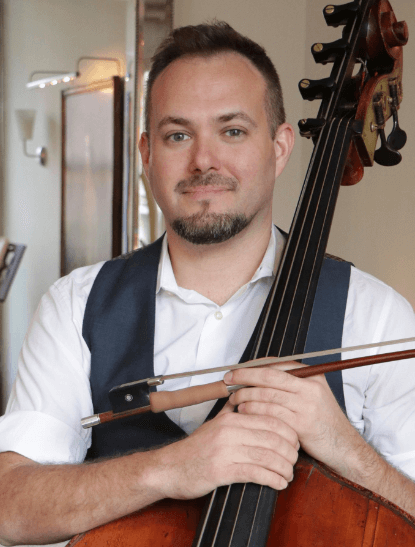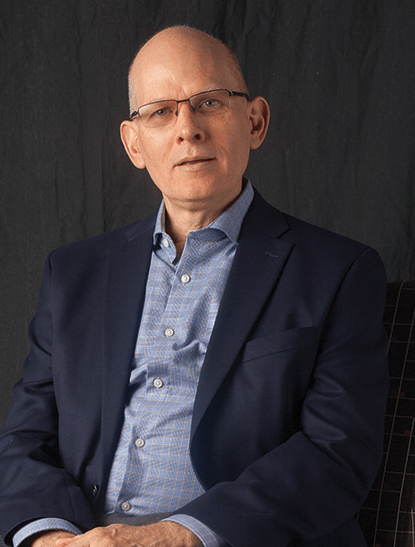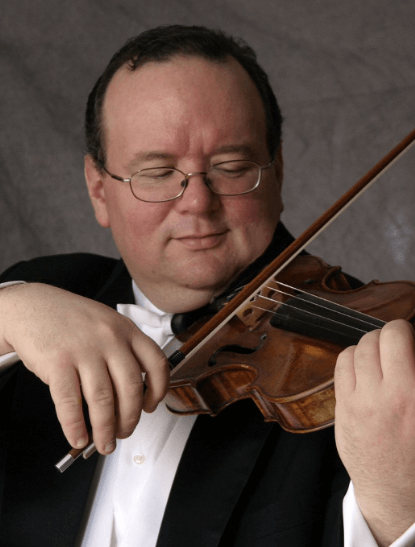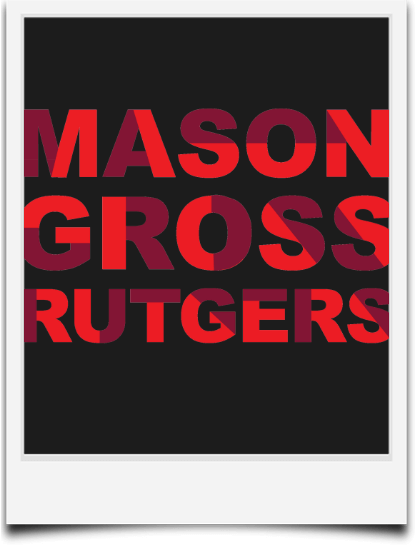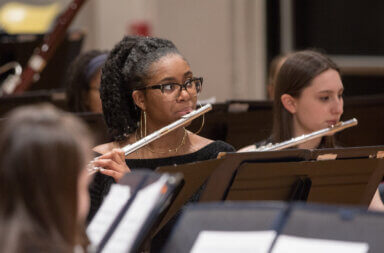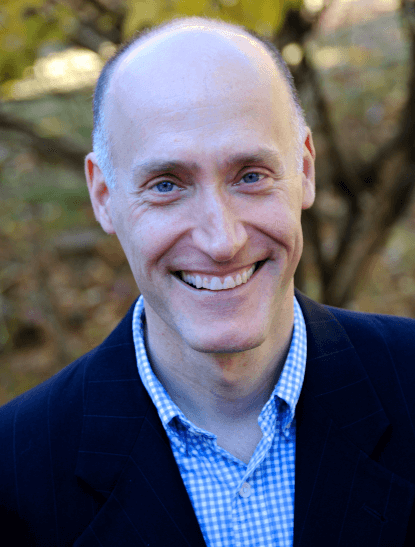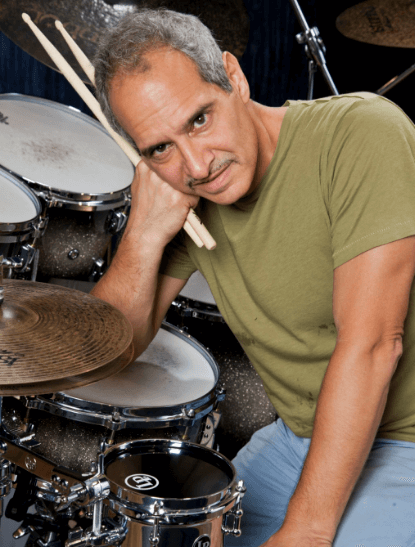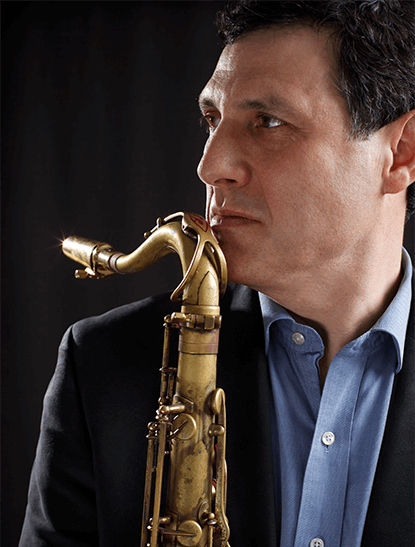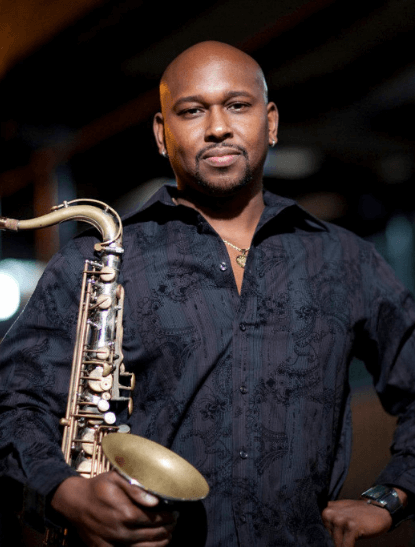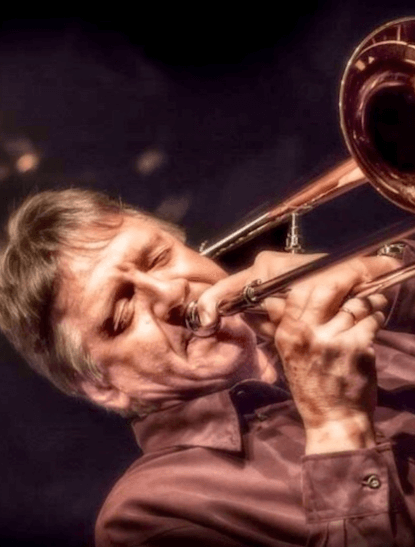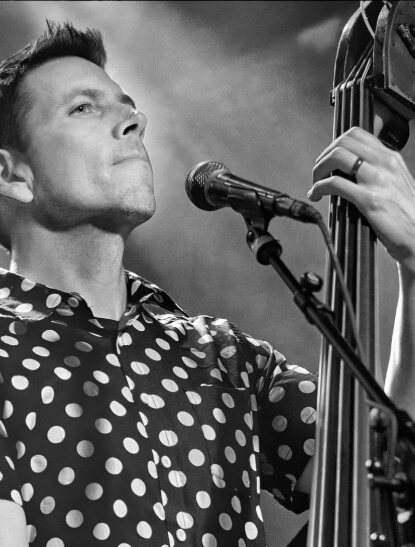The unique nature of Mason Gross enables students to have the advantages of a professionally oriented conservatory program and also benefit from the many resources of a large university. Each student receives personalized attention in a supportive community. At the undergraduate level, this means that students obtain a truly holistic musical education, achieving the highest levels of their craft even as they learn to think about music in broad, humanistic terms. Our undergraduate students also benefit from a weekly “Music Assembly,” where master classes, guest lectures, and other seminars take place in a supportive and nurturing environment.
In our Bachelor of Music program, performance and jazz students are trained for professional careers as performers and educators. In composition, too, students are prepared for professional careers as composers and educators. Students in music education graduate with certification to teach music in New Jersey public schools and receive extensive training in an instrument or voice. All four undergraduate areas provide rigorous instruction in music theory and history, as well as performance/composition, and are complemented by core requirements in the liberal arts.
Mason Gross School of the Arts offers the following BM degrees:
- Bachelor of music degree in music education
- Bachelor of music degree in performance
- Bachelor of music degree in jazz studies
- Bachelor of music degree in composition
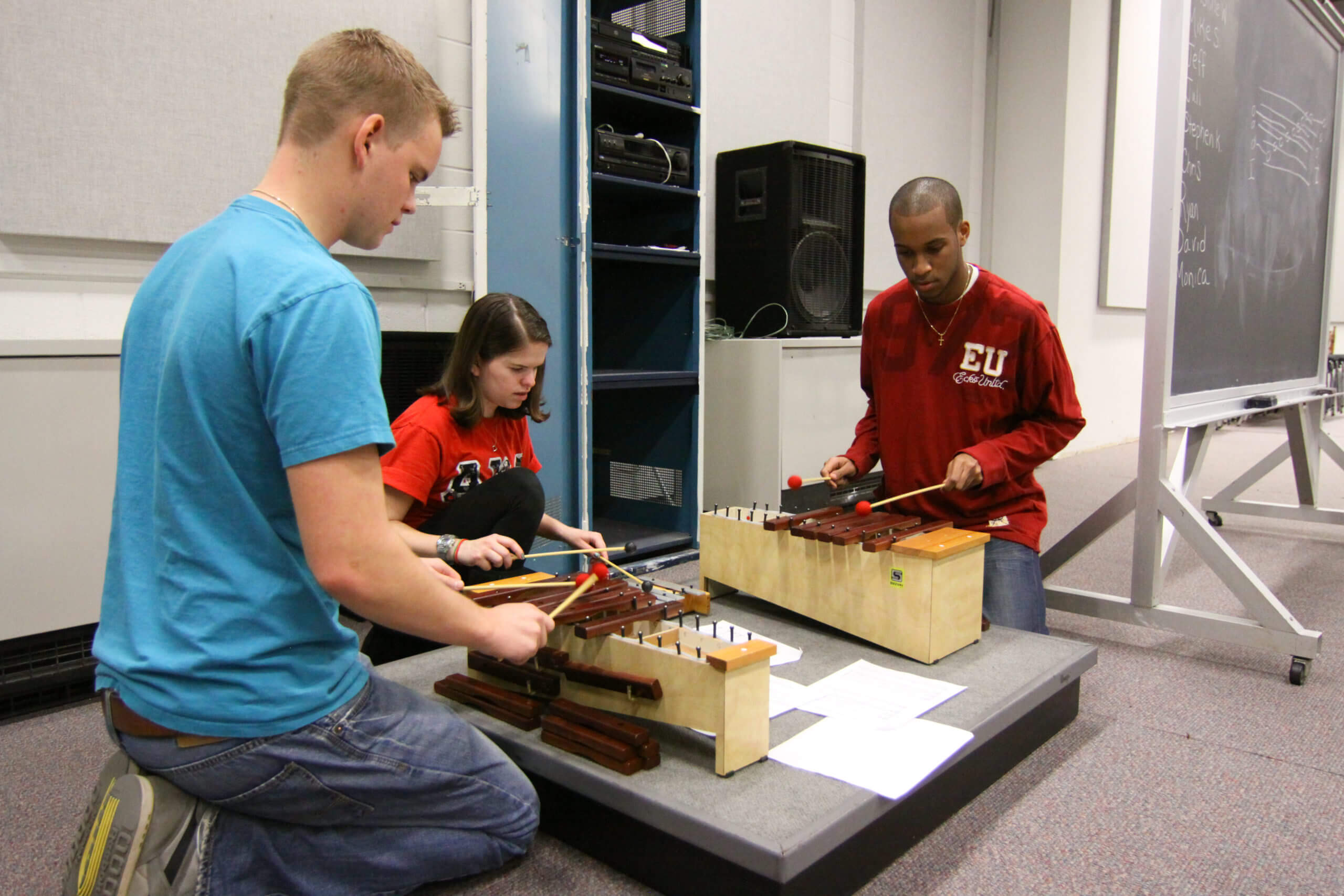
Concentration in Music Education
The bachelor of music in music education program focuses on developing PreK-12 music educators prepared for the realities of music teaching in the 21st century. The program includes music education courses, performance study (private lessons and ensembles), music history, music theory, ear training, and liberal arts studies. Practicums in local schools are included in the program, and the degree leads to a Music Certificate of Eligibility with Advanced Standing (vocal & instrumental; all levels PreK-12) from the state of New Jersey. Music education students have the opportunity to work with the same world-class faculty in instrumental study or voice as students in the performance concentration. Learn more about our vocal and instrumental areas.
Applicants to the music education program complete an interview with the music education faculty in addition to an instrumental or vocal audition. The music education interview focuses on: musical engagement, leadership and work with children, interpersonal and reflective skills, and personal reasons for pursuing music education. Evaluation of this interview is used, in conjunction with academic criteria and audition results, to determine admission to the program. Contact Mason Gross Admissions for more information.
Learning Goals of the BM Degree with Concentration in Music Education
What students will know:
Upon completion of the BM degree with Concentration in Music Education, students will have gained a thorough grounding in current curricular, pedagogical, and professional knowledge in music education and general education. In preparing to become professional music educators, they will know how to individualize and differentiate learning, create and build musically diverse PreK-12 music programs that engage all students in music learning, and be reflective practitioners. They will have gained a strong foundation in musical performance, honing their skills in solo, chamber, and large ensemble settings. Students will have established a strong foundation in the academic study of music, including western music history and music theory, as well as music in diverse cultural contexts.
What students will do:
Upon completion of the BM degree with Concentration in Music Education, students will have learned to employ their curricular, pedagogical, and professional knowledge in music education, as well as critical thinking and creative skills, to become excellent music educators and contribute to the broader musical and artistic environment in which they live. They will apply their musical and pedagogical knowledge to teach all existing forms of school music PreK-12 and address students’ individual learning and identity needs. They will act as reflective practitioners, continually striving to improve their practice and innovate in order to serve schools of the future. Upon graduation, they will be eligible to apply for a Music Certificate of Eligibility with Advanced Standing (vocal & instrumental; all levels PreK-12) from the state of New Jersey.
What students will value:
Upon completion of the BM degree with Concentration in Music Education, students will have learned to value the historical and contemporary role of the arts in education and in society. They will value the diverse backgrounds and learning styles of the students they teach and the importance of helping all students succeed through individualization and differentiation. They will value a wide range of musical traditions and artists representing diverse backgrounds of culture, race, ethnicity, religious beliefs, disability, gender and gender expression, and sexual orientation, and the importance of incorporating this diversity into their teaching practice. They will value that music teaching and learning can and should take many diverse forms suited to the students, school, and community in which they work. They will value reflective practice.
Career Outcomes
The BM in Music with a Concentration in Music Education is a professional preparation program leading to a Music Certificate of Eligibility with Advanced Standing (vocal & instrumental; all levels PreK-12) from the State of New Jersey which enables students to pursue a career as a PreK–12 public school music teacher.
A BM in Music with Concentration in Music Education could also lead to career outcomes such as these:
- PreK–12 music educator at a charter, religious private, or private independent school
- Private lesson instructor
- Teacher at an independent music school
- Arts or nonprofit administration
It could also lead to continuing education in graduate programs.
The bachelor of music in music education is designed to prepare students for careers in music education and leads to a Music Certificate of Eligibility with Advanced Standing (vocal and instrumental; all levels Pre-K to 12) from the State of New Jersey. While Rutgers’ music education students complete either an instrumental or vocal degree track in music education, all students are prepared for the same Music CEAS offered by the state of New Jersey. Students who successfully complete all certification requirements should anticipate receiving their certification in the summer following graduation. Students interested in teaching beyond New Jersey should consult the appropriate state department of education website and will find that their NJ certification is easily transferable. The degree can be completed in four years and requires approximately 134 credit hours. The number of credits completed will depend on the chosen teaching specialty and the normal variation in students’ preparedness. Music education courses focus on developing reflective practitioners prepared to meet the individualized needs of diverse student populations and to teach all forms of music available in 21st century schools. Music education courses include required practicum hours in diverse K-12 music classrooms and emphasize hands-on experience prior to choosing a preferred age level and music content area. Study for music education majors also includes music theory, ear training, music history, conducting, liberal arts, and education coursework. Music education majors study their major instrument with applied faculty, and they have opportunities to perform in recitals and with a variety of Mason Gross ensembles.
After completing the first two years at Mason Gross in intensive music study, music education majors apply to the Music Education Professional Sequence (MEPS). If successful, students are then formally admitted to the teacher certification program and are allowed to take upper division courses. The MEPS includes professional development courses and extensive field experiences in public schools. The culminating experience of the degree is the year of part- and full-time student teaching, where students work in partnership with public school music teachers as they assume the role and responsibilities of a full-time music teacher.
Music education faculty members teach undergraduate and graduate courses, mentor students within their specialty areas, engage in cutting-edge scholarship, conduct performing ensembles, and innovate as leaders in the field of music education.
Director of Research
Associate Professor
Music
Assistant Professor, Music Education
Assistant Professor of Music Education
- Mason Gross is a highly regarded professional school where performance and music education majors receive private instruction from world-renowned artist faculty from the New York and Philadelphia areas.
- Music education majors are prepared to teach all forms of school music for preschool through high school.
- Students receive personal attention through faculty mentoring and advising designed to meet individual needs and interests.
- Music education students seeking additional performance experience may audition to complete a double major in music performance and music education.
- A degree in music education may be completed in as few as four years and offers the following additional benefits:
- High job placement rate
- Music Certificate of Eligibility with Advanced Standing from New Jersey (vocal & instrumental; all levels PreK-12)
- Field experience in diverse school settings
- Opportunity to perform in a variety of large and small ensembles
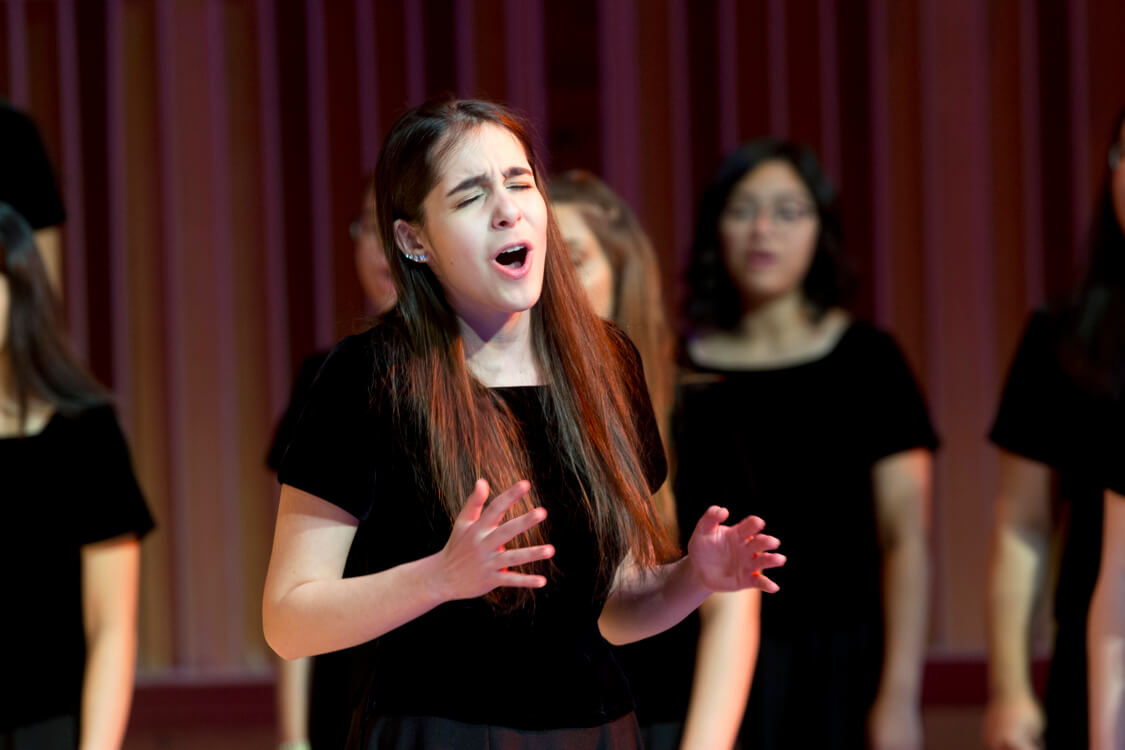
Concentration in Performance
The Mason Gross performance concentration provides a rich curriculum of courses spanning performance practice, private instruction, practical research, and hands-on training. Classes are small, and performance opportunities are abundant. The Music Department mounts 300 performances each year with small and large ensembles including the Symphony Orchestra, Wind Ensemble, Symphonic Winds, Symphony Band, Sinfonia, Marching Scarlet Knights, Concert Band, Kirkpatrick Choir, Glee Club, and Voorhees Choir, and University Choir. Numerous guest artists from the New York music scene and beyond are engaged to connect with students in master classes throughout the year. The performance program supplies students with a firm foundation for a career in music, whether the goal is to perform, teach, or prepare for further study.
Coursework
Students receive a weekly 60-minute lesson with their major performance teacher for 12 weeks of each semester. Students present senior recitals. Participation in ensembles is an essential aspect of the program. At the undergraduate level, courses in music theory emphasize aural skills, analytical techniques, and the writing of tonal harmony and counterpoint. The music history curriculum includes a rigorous examination of Western art music, principles of ethnomusicology, and a variety of special study courses.
Learning Goals of the BM Degree with Concentration in Performance
What students will know:
Upon completion of the BM degree with Concentration in Performance, students will have gained a thorough grounding in their major area of study, honing their skills in solo performance, chamber music, and large ensemble settings. Students will have established a strong foundation in the academic study of music, including western music history and music theory as well as music in diverse cultural contexts. They will have prepared to become professionals in the field of music performance.
What students will do:
Upon completion of the BM degree with Concentration in Performance, students will have learned to employ critical thinking and creative skills to contribute to the field of musical performance and the broader musical and artistic environment in which they live.
What students will value:
Upon completion of the BM degree with Concentration in Performance, students will have learned to value the historical and contemporary role of the arts in society. They will value a wide range of musical traditions and artists representing diverse backgrounds in culture, race, ethnicity, religious beliefs, disability, gender and gender expression, and sexual orientation.
Career Outcomes
This degree program could lead to careers such as:
- Performer/freelance musician
- Member of a professional ensemble
- Private lesson instructor
- Teacher at an independent music school
- Arts or nonprofit administration
It could also lead to continuing education in graduate programs.
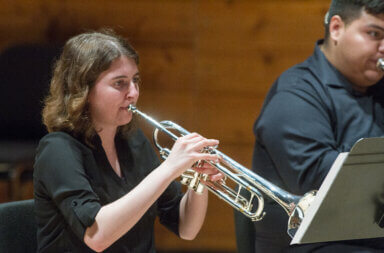
The Mason Gross brass program is designed to provide the highest level of training for young artists and to help them develop the skills needed for a variety of careers in music. The unique nature of Mason Gross enables students to have the advantages of a professionally oriented conservatory program and benefit from the many resources of a large university. Each student receives personalized attention in a supportive community.
Instruments
Euphonium
Horn
Trombone (tenor and bass)
Trumpet
Tuba
Faculty
Students work closely with members of our distinguished faculty, which includes members of the New York Philharmonic, Metropolitan Opera Orchestra, New York City and American Ballet Theater Orchestras, American Symphony and other ensembles in New York City and beyond.
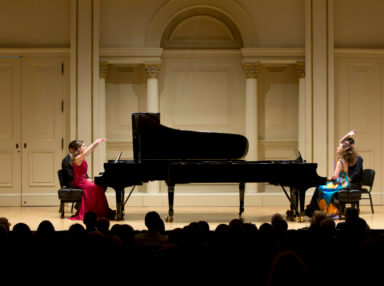
The Mason Gross keyboard program is designed to provide the highest level of training to young artists and to help them develop the skills needed for a variety of careers in music. The undergraduate curriculum centers on individual private lessons, a rigorous music theory and ear training sequence, as well as a variety of courses in music history and ethnomusicology. Study is further supplemented by chamber music, pedagogy, accompanying classes, and a large offering of liberal arts courses.
Instruments
Piano
Faculty
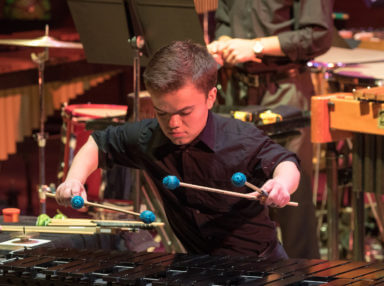
The Mason Gross percussion program prepares students for a broad range of career paths. Building on an orchestral core, including timpani and percussion training, the program encourages students to explore Afro-Cuban traditions, as well as contemporary performance practice in chamber music and solo settings.
The Rutgers Percussion Ensemble, hailed by The New York Times for one of “10 Best Performances of 2017,” performs both on and off campus throughout the year and has been featured at the Percussive Arts Society International Convention in Indianapolis.
The curriculum of the percussion program focuses on development of the orchestral core and allows students to customize their training to address their specific interests in the field. Recent graduates hold orchestral positions, chairs on Broadway shows, and teach around the world.
Faculty
The faculty members in the percussion program “team teach,” meaning that each student receives instruction with all faculty members in both private lessons and masterclasses. The faculty work professionally in all areas of the field—orchestral, Broadway, chamber music, and solo performance. They perform regularly with the Cleveland Orchestra, the New York Philharmonic, the Metropolitan Opera Orchestra, on Broadway, and with new music ensembles throughout the New York area.
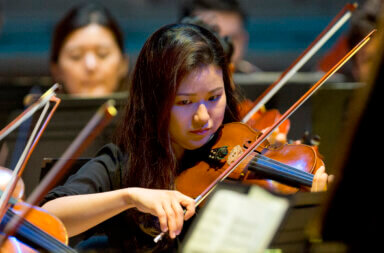
The Mason Gross strings program is designed to provide the highest level of training to young artists and to help them develop the skills needed for a variety of careers in music. Students work closely with members of our distinguished faculty to refine their craft and develop as musicians. The small size of our program helps to ensure a personalized education for each student as well as a communal atmosphere. Study is supplemented by chamber music, orchestral performance, String Ensemble, pedagogy, and an extensive offering of liberal arts courses. The unique nature of Mason Gross enables students to benefit from the advantages of a professionally oriented conservatory program as well as the many advantages of a large university.
Instruments
Cello
Double Bass
Harp
Viola
Violin
Faculty
Community Arts
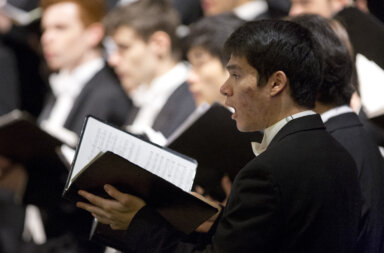
The voice program aims to foster a genuine understanding of efficient, healthy vocalism that features free vocal production with beauty of tone, optimum resonance, and the ability to effectively communicate thoughts and passion through the delivery of word and music on the concert and operatic stages. Students are trained to become disciplined, compelling artists who are performers of vocal repertoire from all genres with a secure knowledge of musical aesthetics, style, performance practice, and accurate diction. Students may participate in any of the several choral ensembles offered including Rutgers Kirkpatrick Choir, Rutgers Glee Club, Rutgers Voorhees Choir, and Rutgers University Choir.
Faculty
The members of the voice faculty include pedagogues who are also distinguished artists with careers that feature numerous productions at the Metropolitan Opera, Covent Garden, Vienna State Opera, La Scala, Carnegie Hall, Lincoln Center, the Musikverein in Vienna; and many other major national and international venues.
The Mason Gross woodwind program is designed to provide the highest level of training for young artists and to help them develop the skills needed for a variety of careers in music. Students work individually with members of our distinguished faculty to develop as musicians. The unique nature of Mason Gross enables students to have the advantages of a both a professionally oriented conservatory program with personalized attention in a supportive community as well as the benefits of the many resources of a large university. Studies will also include pedagogy and an extensive offering of liberal arts courses.
Instruments
Bassoon
Clarinet
Flute
Oboe
Saxophone
Faculty
Our woodwind faculty members appear in the New York and Philadelphia arts communities as members of the New York Philharmonic, New Jersey Symphony Orchestra, Imani Winds, and as freelancers in these and many other ensembles and concerts.
Head of Woodwinds
Associate Professor, Clarinet
Community Arts
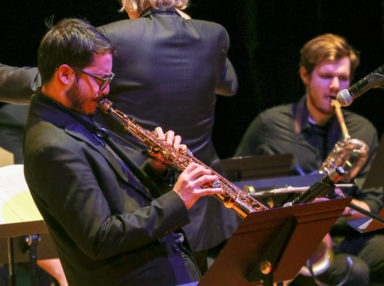
Concentration in Jazz Studies
The Rutgers University jazz program is located less than an hour’s ride from New York City and Philadelphia. The proximity to the New York City jazz scene offers many advantages, including an all-star faculty and performance opportunities at important New York City venues. The undergraduate program in jazz studies offers a comprehensive curriculum that includes jazz improvisation, composition and arranging, jazz history, and private lessons with some of the world’s top jazz musicians and educators.
Instruments
- Bass
- Drums
- Guitar
- Piano
- Saxophone
- Trombone
- Trumpet
Learning Goals of the BM Degree with Concentration in Jazz Performance Studies
What students will know:
Upon completion of the BM degree with Concentration in Jazz Performance Studies, students will have gained a thorough grounding in their major area of study, honing their skills in large and small ensemble settings. Students will have established a strong foundation in the academic study of music, including the theory and history of jazz and other forms as well as music in diverse cultural contexts. They will have prepared to become professionals in the field of jazz performance.
What students will do:
Upon completion of the BM degree with Concentration in Jazz Performance Studies, students will have learned to employ critical thinking and creative skills to contribute to the field of jazz performance and the broader musical and artistic environment in which they live.
What students will value:
Upon completion of the BM degree with Concentration in Jazz Performance Studies, students will have learned to value the historical and contemporary role of the arts in society. They will value a wide range of musical traditions and artists, with special attention to those who built the artform of jazz, representing diverse backgrounds in culture, race, ethnicity, religious beliefs, disability, gender and gender expression, and sexual orientation.
Career Outcomes
This degree program could lead to careers in:
- Freelance performance
- Composition and Arranging
- Private lesson instruction
- Recording Production
- Music Education
The bachelor of music in jazz studies includes a comprehensive curriculum of jazz theory, improvisation, composition and arranging, keyboard, and private lessons with some of the world’s best jazz musicians and educators. This course of study prepares students for a professional career in jazz and commercial music. The following courses are required for the undergraduate degree:
- Theory I & II
- Jazz Theory I & II
- Keyboard Harmony for Jazz Majors I & II
- Jazz Composition and Arranging I & II
- Jazz Improvisation I & II
- Fundamentals of Musicianship I & II
- Introduction to Conducting
Music History [14 credits]:
- Evolution of Jazz
- Introduction to Music History
An all-star faculty has included some of the world’s best jazz musicians and educators, such as Ralph Bowen, Conrad Herwig, Victor Lewis, Kenny Davis, Joe Mosello, Tatum Greenblatt, Eddie Palmieri, Fred Hersch, and Bill O’Connell.
Director, Rutgers Jazz Lab Big Band
Jazz Composition/Arranging
Jazz Historiography
Avant Garde Ensemble
Assistant Teaching Professor
Community Arts
Guest Artists
The jazz program offers students frequent opportunities for guest performances, lectures, and master classes by world-renowned artists. Previous guest artists and clinicians have included Eddie Palmieri, Wynton Marsalis, Frank Sinatra Jr., Jon Faddis, Terell Stafford, Mulgrew Miller, Edward Simon, Benny Golson, Gerald Wilson, Slide Hampton, Tom Harrell, and Paquito D’Rivera, among others.
Rutgers Summer Jazz Institute
The Mason Gross jazz faculty teaches at the Rutgers Summer Jazz Institute for young musicians, ages 13–18, who are interested in improving their jazz improvisation, small group, and large ensemble skills. Visit Rutgers Community Arts for more information.
Alumni
Many of our alumni are performing with internationally renowned artists and groups such as the Vanguard Orchestra, Mingus Big Band, Eddie Palmieri Octet, Harry Connick Jr., Chick Corea, Michel Camilo, and a host of others. In addition to active performing careers, many of our undergraduate and graduate students have earned teaching positions at either the secondary or university level.
Rutgers Jazz and Chamber Jazz ensembles perform at some of the most important venues such as the Blue Note Jazz Club and Symphony Space in New York CIty. Additionally, they have traveled internationally to Fukui, Japan, and have performed and recorded with Benny Carter (State Theatre, New Brunswick/Music Masters Records) and Ray Charles (Trenton War Memorial Hall/PBS Television).
The Rutgers Jazz Ensemble, directed by Conrad Herwig, is the top student jazz ensemble at the Mason Gross School of the Arts. A recent concert series included a tribute to Charles Mingus, featuring Ku-umba Frank Lacy and a performance at the Blue Note, the eighth consecutive year the ensemble has performed at this prestigious venue. Other concert series featured Michael Phillip Mossman and Joe Chambers. Previous guest artists and clinicians have included Eddie Palmieri, Wynton Marsalis, Frank Sinatra Jr. Jon Faddis, Terell Stafford, Mulgrew Miller, Edward Simon, Benny Golson, Gerald Wilson, Slide Hampton, Tom Harrell, Paquito D’Rivera, among others.
View a full list of our jazz ensembles.
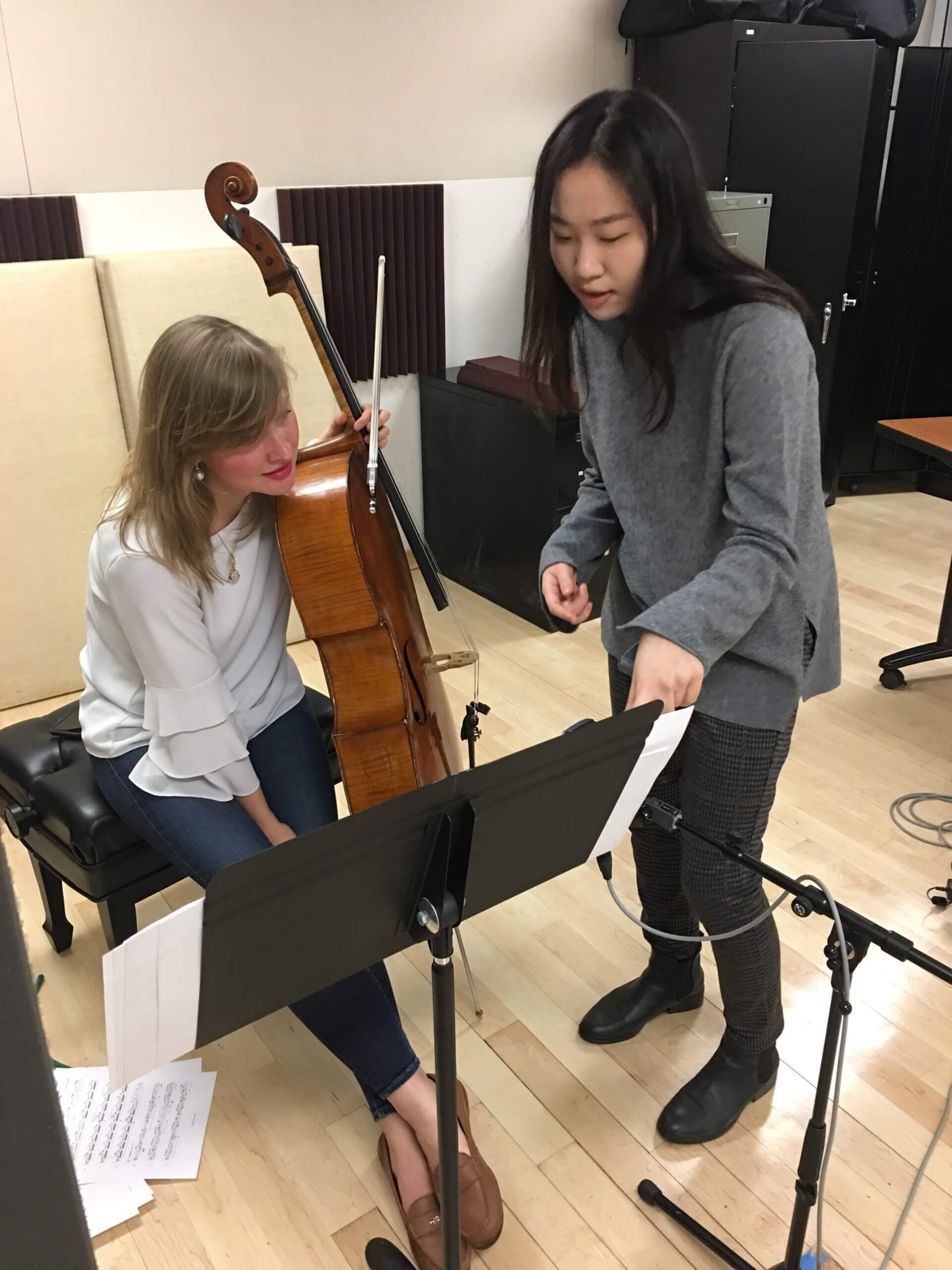
Concentration in Composition
The composition program at Mason Gross School of the Arts prepares students for careers in a variety of musical fields including contemporary concert music, scoring for film and media, and the teaching profession. Our internationally renowned faculty members nurture students’ creative abilities and craft, which helps to develop their voices within the broader world of contemporary music.
Student composers regularly present their music in orchestra and band readings, opera scene workshops, composition department recitals, and multimedia concerts. Student composers also “learn by doing” through individual collaborations with performers, and through mentored, interdisciplinary projects with students in other degree programs and departments at Mason Gross.
This hands-on training in composition is supported by studies in performance, music theory, musicology, music technology, ethnomusicology, and contemporary performance practice, as well as individualized mentorship in career development to prepare students to become professional composers.
Applicants to the composition program submit a portfolio of work and complete an interview with the composition faculty in addition to an instrumental or voice audition. Composition students study a secondary instrument, and they have opportunities to perform in recitals and with a variety of Mason Gross ensembles. Contact Mason Gross Admissions for more information.
Learning Goals of the BM Degree with Concentration in Composition
What students will know
Upon completion of the BM degree with Concentration in Composition, students will have gained a thorough grounding in their major area of study, honing their skills in a range of compositional practices and in working with performers to realize their music. They will have gained a strong foundation in musical performance, honing their skills in solo, chamber, and large ensemble settings. Students will have established a strong foundation in the academic study of music, including western music history and music theory as well as music in diverse cultural contexts. They will have prepared to become professionals in the field of music composition.
What students will do
Upon completion of the BM degree with Concentration in Composition, students will have learned to employ critical thinking and creative skills to contribute to the field of musical composition and the broader musical and artistic environment in which they live.
What students will value
Upon completion of the BM degree with Concentration in Composition, students will have learned to value the historical and contemporary role of the arts in society. They will value a wide range of musical traditions and artists representing diverse backgrounds in culture, race, ethnicity, religious beliefs, disability, gender and gender expression, and sexual orientation.
Career Outcomes
This degree program could lead to careers such as:
- Professional composer/arranger
- Professional in film/media scoring
- Private lesson instructor
- Teacher at an independent music school
- Arts or nonprofit administration
It could also lead to continuing education in graduate programs.
In the composition program at Mason Gross, we believe in music without boundaries. In addition to foundational training in classical composition, our students compose works reflecting their interest in jazz and pop, music theater, media scoring, game music, and much else. They compose on paper, using notation software, and in digital audio workstations and train for careers in a variety of musical fields. These include contemporary concert music, scoring for film, games, and other digital media, and the teaching profession. Our internationally renowned faculty members nurture students’ creative abilities and craft, which helps to develop their voices within the broader world of contemporary music.
Student composers regularly present their music in orchestra and band readings, opera scene workshops, composition department recitals, and multimedia concerts. Student composers also “learn by doing” through individual collaborations with performers, and through mentored, interdisciplinary projects with students in other degree programs and departments at Mason Gross.
This hands-on training in composition is supported by studies in performance, music theory, musicology, music technology, ethnomusicology, and contemporary performance practice, as well as individualized mentorship in career development to prepare students to become professional composers.
Applicants to the composition program submit a portfolio of work and complete an interview with the composition faculty in addition to an instrumental or voice audition. Composition students study a secondary instrument, and they have opportunities to perform in recitals and with a variety of Mason Gross ensembles. Contact Mason Gross Admissions for more information.
At the undergraduate level, private instruction in composition is supplemented by courses in:
- Media Scoring
- Music Theory
- Orchestration
- Conducting
- Recording and computer music
- Musicology and ethnomusicology
- Private instruction as an instrumentalist or vocalist
- Performance with large and small ensembles
Each year, our composers take part in a variety of department-sponsored opportunities:
- Reading sessions of student orchestral works by the Rutgers Symphony Orchestra
- Concerts of student chamber music presented by the Rutgers University New Music Ensemble
- Performances by HELIX, the graduate contemporary chamber orchestra
- Annual concerts of electroacoustic music through the New Jersey Digital Audio Concert series
- Performances of student works for laptop orchestra by the Rutgers Interactive Music Ensemble
- Composer-choreographer collaborations in partnership with the Dance Department
- Composing for visiting professional soloists and ensembles
- Reading sessions of student works by Rutgers Wind Bands
- Part-time lecturer and assistant teaching positions offer valuable classroom experience under the guidance of experienced faculty
Undergraduate and graduate composers are required to participate in the composition practicum, where students share their in-progress pieces, collaborate with members of the other programs at Mason Gross and attend lectures by visiting composers. The practicum also covers issues of notation, score preparation, compositional form, professional development and affiliations, rehearsal techniques, and other practical issues for the contemporary composer. Students are also encouraged to pursue off-campus professional opportunities while they are at Rutgers. The faculty guide students through the process of submitting appropriate work to conferences, festivals, and journals, and students may apply for funds for professional travel. Our proximity to New York City allows students to immerse themselves fully in one of the most active new music communities in the world. Students may also present their academic work at meetings of the Rutgers University Musicological Society.




